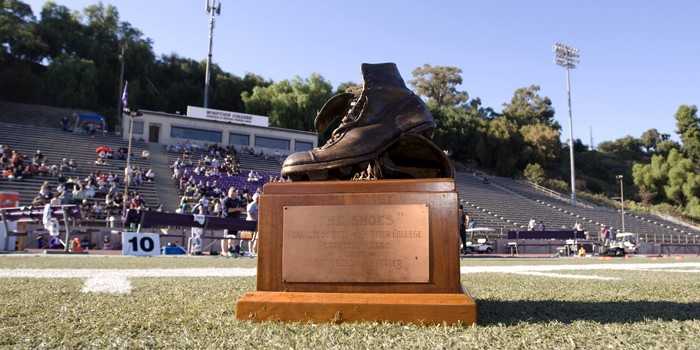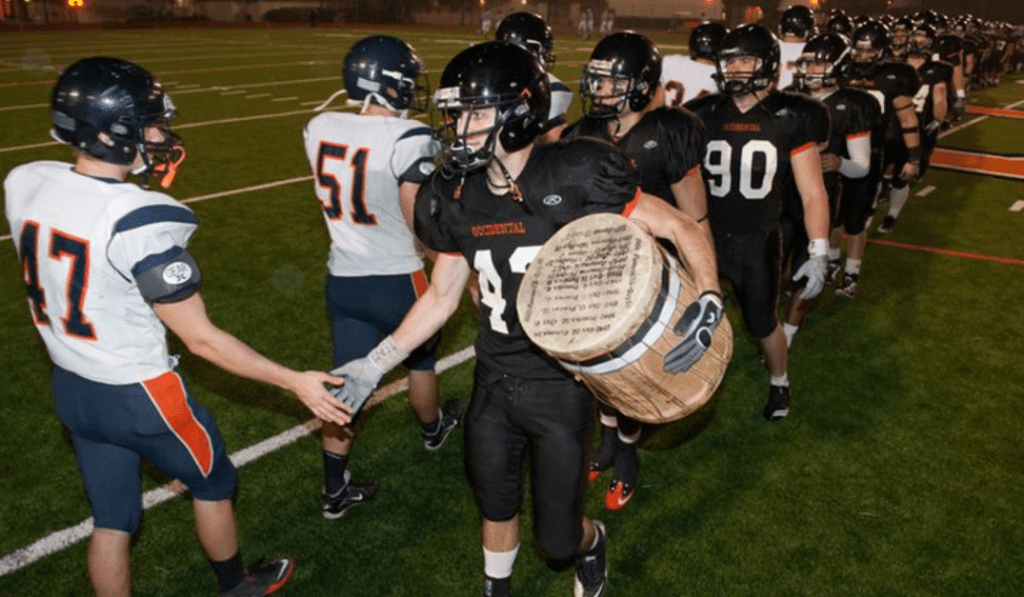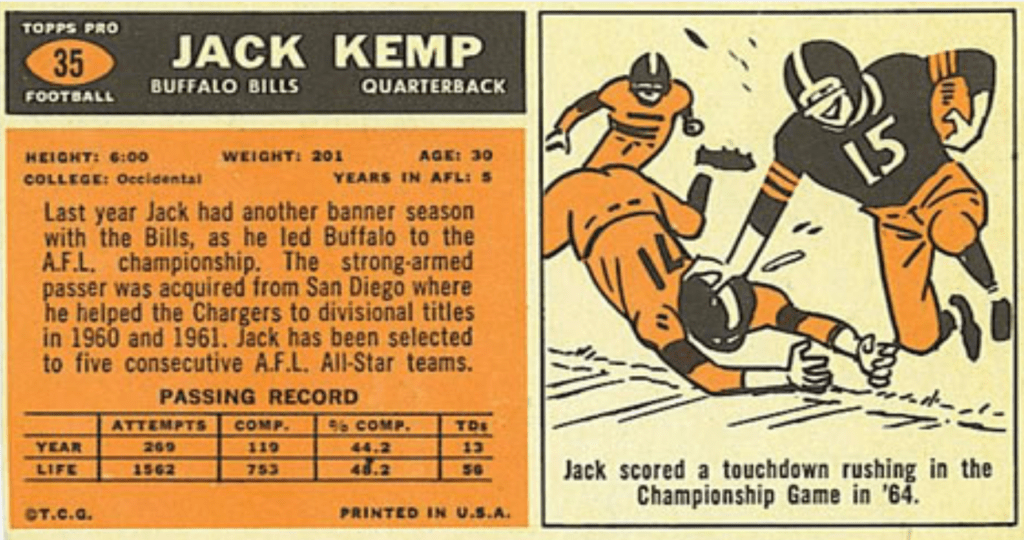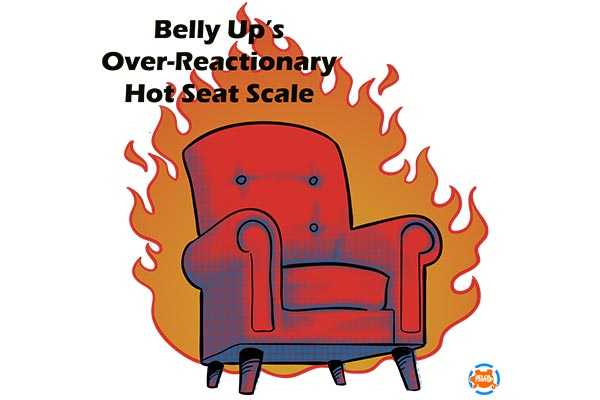It’s been just two weeks since the announcement was made. Players and coaches alike were blindsided in the late afternoon. The alumni and college community found out hours later. The link between each “retired” student-athlete, no matter if they had been retired for a few moments or a few decades, felt stronger in the moment the chain was ended. In the coming days and weeks, former players poured out their stories of their experience playing for the school. Every tale was a mixture of anger, sadness, and hurt. This, after a week of taking things in, is an effort to get one of those stories out. Tuesday, October 13th, Occidental College officially discontinued its college football team.
The School and Football
Occidental, located in northeast Los Angeles, is both affectionately and unaffectionately referred to as “Oxy.” It was one of the nation’s oldest Division III college football programs. The Oxy Tigers played in two of the nation’s oldest rivalry games every year. Oxy played the Whittier College Poets for “The Shoes,” a bronzed pair of cleats stolen and turned into a trophy in 1940, for 79 seasons. Occidental also played a combination of Pomona and Pitzer Colleges for “The Drum,” which began in 1895 and was the oldest standing college football rivalry west of the Mississippi River. Both storied rivalries became historic ones with the school’s decision.
Oxy’s most famous alum is a guy who went by Barack “Barry” Obama while on campus. But the Occidental football program has produced almost 20 players that received some form of NFL tryout. The legacy of Tigers in the NFL ranges from the era of single-bar facemasks on Jack Kemp in ‘57, to the speedy kick returning of Vance Mueller in ‘86, to as recently as class of 2017’s Bryan Scott’s work with the Rams, Atlanta and Kansas City before playing in the Canadian Football League and, more currently, The Spring League. But perhaps the most famous Oxy football alumni if Jim Mora Sr. To be fair, not knowing how to talk about the playoffs doesn’t speak well to the Oxy education.
Player of the Game @BryanScottQb on keeping the Generals energy up during a TV game tonight. pic.twitter.com/3Vf2RIjWE6
— The Spring League ? (@TheSpringLeague) October 28, 2020
The school’s decision to cut football dates back to just after Scott left, in the fall of 2017. In 2016 and 2017, Oxy graduated the all-time leading rusher (Kwame Do) and passer (Bryan Scott) in the history of the Southern California Intercollegiate Athletic Conference. Then things fell apart. In the 2017 season, Head Coach Rob Cushman’s first season at the helm, Oxy was forced to forfeit their last four games of the season. Their already small roster was injury-ridden, and they couldn’t consciously field a team that didn’t risk further injury to players playing dramatically out of position. The following January, a football alumni task force was put together. Fundraising and recruiting goals were put in place, and both were met before spring practices were scheduled to start.
The then-college-President Jonathan Veitch commented that we can’t lose sight of the significant challenges that still exist,” including the College’s insistence on maintaining its academic standards. This month, current-college President Harry Elam, in a statement published by the athletic program, made sure to point out that the decision was also made in part because “a significant sustained financial investment from the College, above and beyond what has already been raised, is required to maintain a safe and competitive football program, even though the current football budget already represents almost 20% of total direct expenses for all 21 varsity teams.”

Cutting football, it appears, is both an academic and financial decision.
“We want to offer the best possible experience for our student-athletes, and the College has determined that to do so for football would require a level of investment that is not sustainable, especially relative to other priorities and following the impact of the pandemic,” Elam also said. The statement continued in much more depth about the competitive chasm being underfunded as a program creates.

And herein lies the problem. The focus is on the wrong things. And when focus is on those things, collegiate football will never make any sense. At any school. These arguments could be made about any athletic program in the NCAA.
The Problem
Arguing that an athletic program damages your academic reputation is not only wrong it’s a misunderstanding of what it means to educate. It’s dangerous because it is implying that folks playing that game aren’t smart enough to be at your school. The Ivy League has football. Every Power Five conference has strong universities (Duke, Northwestern, Stanford, Vanderbilt, etc.), and they all play football. The Patriot League is filled with academically demanding universities that have football teams. Division III itself is filled with challenging institutions that have football teams. It can be done if you want it to be done.
But this is not just inaccurate, it’s dangerous. The idea of focusing on just educating through an academic program, or on having a good return on investment from athletics, will inherently keep a school from ever offering any athletic program… Especially a Division III athletic program at a liberal arts school. Liberal arts colleges and universities pride themselves on educating without pre-professional programs, on creating well-rounded individuals, and on educating whole people. Football, as any extra-curricular program, is a part of that education. And arguing football is taking away from the education your school is offering means all of the extracurriculars would be.
Highly successful academic schools don’t just offer athletics for a fun thing to watch on the weekends. They offer athletics as another way to educate and grow their students. Oxy’s own website argues that a key part of the unique education offered is that students “spend as much time in the lab, the field, and the community as they do the classroom.” Much like admitting students who will cultivate and develop their talents as debaters and arbitrators, or scientists and researchers, collegiate athletics are a place for athletic students to build skills in a way that can’t be mimicked. If Occidental, and any other liberal arts college, aims to educate students in the interdisciplinary way their mission states then they shouldn’t be cutting a large program that teaches their students in a way no other part of campus can.

“Ok, Parker… But President Elam also said it was financial. So, what if a school is tired of throwing so much money at it?”
This is where the future of college athletics may be in trouble. That’s all college athletics. At all colleges. Because here’s the dirty secret: very few college athletic programs are “worth the money.” In 2016, The Guardian reported that the average Division I institution lost $12.6M on their athletic program if they had no football team, and $14.4M if they did. Division II was $4.1M and $5.1M respectively, and Division III was $1.6M and $3.1M. No matter the division or whether or not they have a football program, having athletics is a money-losing proposition. A multi-million dollar one.
But education should not be a money-making proposition. Athletics, arts, and everything else ithat happens outside of the classroom are all key parts of a college education. The much larger issue with the argument Oxy is using, and the one that translates to nearly every college, is the idea that it isn’t worth the financial investment to support. This thing that provides an unreplicable educational value is not worth the money anymore.
And thus we arrive at the ultimate danger: at some point, if schools focus on only making money, all of the extracurriculars will be cut. Football, the local one-act, and the quidditch team are all going to go by the wayside. They don’t bring in money.
After it takes a rip through the non-academic activities, the same thought process will eventually bleed into programs offered as an area of study. Why offer a Religious Studies major? Or a Comparative Literature major? Alums in those fields don’t make the same amount of money, per Georgetown University’s research. If the alums with humanities degrees don’t have the money to donate, why pump out any humanities degrees? Cut them. Just like sports. If they don’t make money, why bother?

At what point is there an argument for any college, not in the Power Five division to keep any athletics? Yeah, the kids benefit, but it doesn’t make any money to support an athletic program. And in the words of DJ Quik, “if it don’t make dollars, it don’t make sense.”
If this whole article comes off as personal, it’s because it is. There is something off-putting about a school cutting the very thing that brought you in. Saying “we don’t want folks like that in our academic circle” and “folks like that aren’t worth the money” is a stab at, well, us folks.
I myself am an Oxy alum and “retired” football player. While I was an ok high school player, I wasn’t anywhere near what I’d call a “good” college one. That doesn’t mean I learned any less from my experience. My educational experience was predicated on the opportunity to play. Some of my teammates were very good. Some of my teammates were closer to myself. All of my teammates contributed to my personal, ongoing educational journey. We learned together and from each other in a way unmirrored in the college experience.
I am also a humanities major. (“History.” Yes, it’s that simple on my diploma.) I see the value in the things that don’t make money. I see that they are fading away from the education at my alma mater and places like it across the country. Education is about growth, and taking away opportunities for people to grow opposes that.
President Elam won’t read this and ever change his mind, nor will other college and university presidents faced with similar decisions. But cutting football, or any sport, because you don’t want it in your academic standard is a slippery slope. Cutting football, or any sport, because it doesn’t have a good return on investment is a slippery slope. And it appears that’s where we’re headed.
Follow me on Twitter @painsworth512 for more, and give our podcast “F” In Sports a listen wherever you listen to podcasts!





